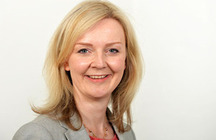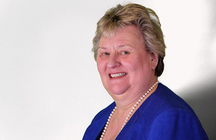Elizabeth Truss – 2013 Speech at the Institute of Physics

Below is the text of the speech made by Elizabeth Truss at the Institute of Physics on 9th December 2013.
Thank you very much for the introduction – I’m delighted to be here at the Institute of Physics for the launch of another excellent report.
I think ‘Closing doors’ is a great name for this report, because what we’re talking about here is the way young people, particularly girls, are dropping subjects which could offer very good prospects for them and which lead to fulfilling careers.
Last week, the PISA education test scores hit the headlines, where England ranked 26th in the world for maths, 21st for science, and 23rd for reading.
If we are to do better in the PISA rankings, it’s vitally important that we particularly improve the performance of girls in critical subjects like maths and science. One thing that’s particularly interesting from the PISA report is that we had one of the lowest gender gaps in reading, where girls traditionally do better than boys, but we had one of the highest gender gaps for science, where boys traditionally do better than girls.
Too often we focus on maths and science separately, but this report gets across the broader message to parents, teachers and the wider public that all these subjects together are very important, very high value subjects.
For school pupils, that means that studying maths and sciences opens up their career options, whatever field they want to work in. In this country maths has a higher earnings premium than in other countries, which demonstrates that we are not producing enough qualified individuals in these areas to go on and work in industry.
If we think about any industry now, people with maths skills, physics skills and computer science skills are vital, because technology is transforming those industries. If we look at agriculture, often seen as a traditional industry, you will see people programming computers and doing advanced engineering. Likewise in the fashion industry; these skills are equally as important, whether it’s media or marketing.
We need to get away from the idea that it’s just a few scientists in a laboratory who need these skills. Maths and science are universal skills that all our young people need. This is shown up in the earnings premia. At age 10 and 18, those with good maths skills earn up to 10% more as adults than those without. Maths and computer science and engineering are among the top 5 degrees for future earnings.
We also know there are increasing returns to education across the OECD. If you look at the data from the 1960s to the present day, the correlation between education and economic growth has increased by a third. So educational underperformance is increasingly important for our country’s economic performance.
The Institute of Physics has pointed out the problem we have. In 2010 to 2012, 4 times as many boys took A level physics as girls did; 60% of the entries to A level maths were boys. In 2012 alone, 12 times as many boys did A level computer studies. Just 4% of state schools have equal numbers of girls and boys progressing from GCSE to A level for the subjects covered in the Institute of Physics’ report.
We also know that there’s a performance difference between girls and boys in this country. In PISA, our boys outperformed girls in maths by 13 points, 2 points bigger than the international average gender gap. In science, boys did a full 14 points better, when the OECD average gap is just 1 point.
And the issue for girls is not competence, it’s confidence. TIMSS, another international education study, tells us boys are already more confident in maths than girls at age 10. By 14, girls have actually lost confidence, and the gap with boys has grown.
This is borne out by the PISA results, which shows that we have high anxiety levels for girls in these subjects.
We need to be more conscious of the messages we’re giving to girls.
Even with the highest-performing girls, fewer of them will go on and take physics at A level. Almost half of boys who get an A* in physics GCSE go on to do the subject at A level, but for girls, it’s just a fifth. We know there is a clear relationship between a pupil’s confidence in a subject and attainment – and we have a generation of girls who are nervous about maths and science.
This is a very worrying picture. It means we’re missing an opportunity: because improving the performance of girls wouldn’t just improve their individual earnings potential. It would improve the country’s economic and educational performance, too.
But the international comparisons give us hope: none of this is inevitable. Top-performing places like Singapore or Shanghai have a negligible gender gap. In the PISA science scores, all but 4 countries that equalled or outperformed England had no significant gender gap.
So this shows us that addressing our gender gap will help us improve our PISA performance, as well as helping those girls open the doors to more careers.
I also think there’s a cultural issue in England. We can see it in the chemistry sets marketed as boy’s toys or a wider culture towards maths and science thinking that it’s something for specialists or geeks, parents saying to our daughters ‘oh, I’m useless at maths’, as if that won’t discourage them. Or perhaps the Top Gear Formula 1 feature where boys were engineers and technicians – and girls, hostesses and press officers. Relentless stereotyping is still going on.
Too often, narrow conceptions of maths or sciences convince girls that they can’t or shouldn’t do these subjects. That feeds the cycle where it’s harder for the few girls who do want to do these subjects.
This is starting to change. Thanks to our English Baccalaureate – the performance table measure that encourages pupils into the most respected subjects – the number of girls doing GCSE physics is now at a record high and has almost caught up with boys. 73,000 girls are now taking the subject compared to 76,000 boys. The critical thing is to make sure those young people continue doing the subject at A level.
A lot of the evidence shows that young people make up their mind about their career aspirations before the age of 16. We need to work with the grain of young people’s aspirations – not persuade everybody they want to be a research scientist, desirable though that career option is, but acknowledge that 60% of children want to go into business. We need to show them that maths and sciences are an excellent basis for these careers too.
Look at the CEO of Prudential, Tidjane Thiam, a nuclear physicist. Let’s have more of these examples of people who have succeeded in busineas by using their analytical skills and the knowledge they’ve gained by studying maths, physics and computer science. These aren’t just subjects for brainboxes who want to do research sciences. It’s a really important background for a career and will give you transferable skills to help you succeed.
As the institute’s report shows, schools can make a big difference here. They can use their influence to challenge gender stereotypes – or reinforce them. Many are using the new curriculum to show girls what they could do. They’re using design and technology to demonstrate the vast range of applications of maths and science, or taking advantage of programmes like Stimulating Physics Network which champion these subjects.
It’s vital that we improve the quality of teaching in these important subjects. Last week I announced new maths hubs which will work on improving the quality of teaching of mathematics at primary. We’re also offering very high bursaries to aspiring teachers in maths, physics and computer science.
A lot of it comes down to encouragement of all children, especially girls. All of us – politicians, parents, professionals – need to communicate that maths and science aren’t just useful for niche careers. They’re the foundation of the modern world.
If we do that, then we will open up options and eventually, better jobs, for our children. And this time, not just for the boys.

